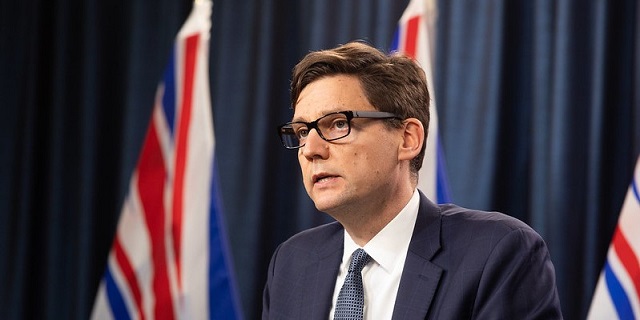Uncategorized
Taxpayers Federation calling on BC Government to scrap failed Carbon Tax

From the Canadian Taxpayers Federation
By Carson Binda
BC Government promised carbon tax would reduce CO2 by 33%. It has done nothing.
The Canadian Taxpayers Federation is calling on the British Columbia government to scrap the carbon tax as new data shows the province’s carbon emissions have continued to rise, despite the oldest carbon tax in the country.
“The carbon tax isn’t reducing carbon emissions like the politicians promised,” said Carson Binda, B.C. Director for the Canadian Taxpayers Federation. “Premier David Eby needs to axe the tax now to save British Columbians money.”
Emissions data from the provincial government shows that British Columbia’s emissions have risen since the introduction of a carbon tax.
Total emissions in 2007, the last year without a provincial carbon tax, stood at 65.5 MtCO2e, while 2022 emissions data shows an increase to 65.6 MtCO2e.
When the carbon tax was introduced, the B.C. government pledged that it would reduce greenhouse gas emissions by 33 per cent.
The Eby government plans to increase the B.C. carbon tax again on April 1, 2025. After that increase, the carbon tax will add 21 cents to the cost of a litre of natural gas, 25 cents per litre of diesel and 18 cents per cubic meter of natural gas.
“The carbon tax has cost British Columbians a lot of money, but it hasn’t helped the environment as promised,” Binda said. “Eby has a simple choice: scrap the carbon tax before April 1, or force British Columbians to pay even more to heat our homes and drive to work.”
If a family fills up the minivan once per week for a year, the carbon tax will cost them $728. The carbon tax on natural gas will add $435 to the average family’s home heating bills in the 12 months after the April 1 carbon tax hike.
Other provinces, like Saskatchewan, have unilaterally stopped collecting the carbon tax on essentials like home heating and have not faced consequences from Ottawa.
“British Columbians need real relief from the costs of the provincial carbon tax,” Binda said. “Eby needs to stop waiting for permission from the leaderless federal government and scrap the tax on British Columbians.”
Uncategorized
Kananaskis G7 meeting the right setting for U.S. and Canada to reassert energy ties


Energy security, resilience and affordability have long been protected by a continentally integrated energy sector.
The G7 summit in Kananaskis, Alberta, offers a key platform to reassert how North American energy cooperation has made the U.S. and Canada stronger, according to a joint statement from The Heritage Foundation, the foremost American conservative think tank, and MEI, a pan-Canadian research and educational policy organization.
“Energy cooperation between Canada, Mexico and the United States is vital for the Western World’s energy security,” says Diana Furchtgott-Roth, director of the Center for Energy, Climate and Environment and the Herbert and Joyce Morgan Fellow at the Heritage Foundation, and one of America’s most prominent energy experts. “Both President Trump and Prime Minister Carney share energy as a key priority for their respective administrations.
She added, “The G7 should embrace energy abundance by cooperating and committing to a rapid expansion of energy infrastructure. Members should commit to streamlined permitting, including a one-stop shop permitting and environmental review process, to unleash the capital investment necessary to make energy abundance a reality.”
North America’s energy industry is continentally integrated, benefitting from a blend of U.S. light crude oil and Mexican and Canadian heavy crude oil that keeps the continent’s refineries running smoothly.
Each day, Canada exports 2.8 million barrels of oil to the United States.
These get refined into gasoline, diesel and other higher value-added products that furnish the U.S. market with reliable and affordable energy, as well as exported to other countries, including some 780,000 barrels per day of finished products that get exported to Canada and 1.08 million barrels per day to Mexico.
A similar situation occurs with natural gas, where Canada ships 8.7 billion cubic feet of natural gas per day to the United States through a continental network of pipelines.
This gets consumed by U.S. households, as well as transformed into liquefied natural gas products, of which the United States exports 11.5 billion cubic feet per day, mostly from ports in Louisiana, Texas and Maryland.
“The abundance and complementarity of Canada and the United States’ energy resources have made both nations more prosperous and more secure in their supply,” says Daniel Dufort, president and CEO of the MEI. “Both countries stand to reduce dependence on Chinese and Russian energy by expanding their pipeline networks – the United States to the East and Canada to the West – to supply their European and Asian allies in an increasingly turbulent world.”
Under this scenario, Europe would buy more high-value light oil from the U.S., whose domestic needs would be back-stopped by lower-priced heavy oil imports from Canada, whereas Asia would consume more LNG from Canada, diminishing China and Russia’s economic and strategic leverage over it.
* * *
The MEI is an independent public policy think tank with offices in Montreal, Ottawa, and Calgary. Through its publications, media appearances, and advisory services to policymakers, the MEI stimulates public policy debate and reforms based on sound economics and entrepreneurship.
As the nation’s largest, most broadly supported conservative research and educational institution, The Heritage Foundation has been leading the American conservative movement since our founding in 1973. The Heritage Foundation reaches more than 10 million members, advocates, and concerned Americans every day with information on critical issues facing America.
Uncategorized
Poilievre on 2025 Election Interference – Carney sill hasn’t fired Liberal MP in Chinese election interference scandal

From Conservative Party Communications
“Yes. He must be disqualified. I find it incredible that Mark Carney would allow someone to run for his party that called for a Canadian citizen to be handed over to a foreign government on a bounty, a foreign government that would almost certainly execute that Canadian citizen.
“Think about that for a second. We have a Liberal MP saying that a Canadian citizen should be handed over to a foreign dictatorship to get a bounty so that that citizen could be murdered. And Mark Carney says he should stay on as a candidate. What does that say about whether Mark Carney would protect Canadians?
“Mark Carney is deeply conflicted. Just in November, he went to Beijing and secured a quarter-billion-dollar loan for his company from a state-owned Chinese bank. He’s deeply compromised, and he will never stand up for Canada against any foreign regime. It is another reason why Mr. Carney must show us all his assets, all the money he owes, all the money that his companies owe to foreign hostile regimes. And this story might not be entirely the story of the bounty, and a Liberal MP calling for a Canadian to be handed over for execution to a foreign government might not be something that the everyday Canadian can relate to because it’s so outrageous. But I ask you this, if Mark Carney would allow his Liberal MP to make a comment like this, when would he ever protect Canada or Canadians against foreign hostility?
“He has never put Canada first, and that’s why we cannot have a fourth Liberal term. After the Lost Liberal Decade, our country is a playground for foreign interference. Our economy is weaker than ever before. Our people more divided. We need a change to put Canada first with a new government that will stand up for the security and economy of our citizens and take back control of our destiny. Let’s bring it home.”
-

 Business1 day ago
Business1 day agoWEF-linked Linda Yaccarino to step down as CEO of X
-

 Automotive2 days ago
Automotive2 days agoFederal government should swiftly axe foolish EV mandate
-

 Crime2 days ago
Crime2 days agoTucker Carlson: US intelligence is shielding Epstein network, not President Trump
-

 International2 days ago
International2 days agoNo more shoes off: Trump ends TSA’s decades-old rule
-

 Alberta2 days ago
Alberta2 days ago‘Far too serious for such uninformed, careless journalism’: Complaint filed against Globe and Mail article challenging Alberta’s gender surgery law
-

 Freedom Convoy2 days ago
Freedom Convoy2 days agoCourt Orders Bank Freezing Records in Freedom Convoy Case
-

 Business1 day ago
Business1 day ago‘Experts’ Warned Free Markets Would Ruin Argentina — Looks Like They Were Dead Wrong
-

 Automotive1 day ago
Automotive1 day agoAmerica’s EV Industry Must Now Compete On A Level Playing Field






